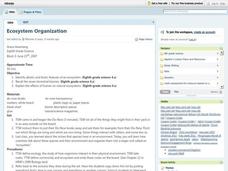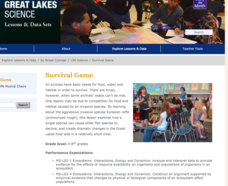Curated OER
How to Keep a Scientific Journal
Young scholars record observations of a living organism over a period of time. They observe meal worms and record their observations in a scientific journal.
Curated OER
Your Day as a Cycle
Fourth graders investigate several cycles such as life cycles, and the moon cycle. They examine the sequences and patterns that are associated with daily life by keeping a daily journal for three days, and comparing it with others....
Curated OER
Food Chains
Learners take a look at the relationship between organisms in food chains, food webs, and energy pyramids. After an opening demonstration by the teacher, pupils are split up into groups. Each one is assigned an environment such as:...
Curated OER
Recyclers to the Rescue
Producers, consumers, food chains, and plants are the stars of this science lesson. Learners take part in an inquiry which helps them to discover the most effective and efficient way to grow a producer. They have a variety of containers...
Virginia Department of Education
DNA Structure, Nucleic Acids, and Proteins
What is in that double helix? Explain intricate concepts with a variety of creative activities in a lesson that incorporates multiple steps to cover DNA structure, nucleic acids, and proteins. Pupils explore the history of DNA structure,...
Virginia Department of Education
Mendelian Genetics
How did Mendel know which pea plants would demonstrate certain characteristics? Pupils explore the answer this question, among others, as they complete Punnet squares, research dominant and recessive traits, and explore hereditary...
Curated OER
Ecosystem Organization
Eighth graders engage in a lesson about ecosystems with the intention of looking at how it is organized. They cover the biotic and abiotic factors of an ecosystem while looking at the seven types of terrestrial biomes. Students write...
Curated OER
Lake Superior Ecology Unit
Sixth graders research Lake Superior and its ecosystem. Students investigate the lake's cycles of mixing and stratification and how these cycles affect the biology of the lake. This lesson plan contains five days of activities.
Curated OER
City Wildlife in a Vase
Students examine a still-life painting. They discuss the observation of nature by scientists and artists and explore the symbolism of biological life cycles depicted in a painting.
Curated OER
Hazard Mitigation: Bioterrorism
Students discuss different ways to spread infectious diseases. In this bioterrorism lesson, students model the rate of smoke emission using CalRoad software. They analyze the effects of airborne release of biological...
Curated OER
Seeing Cells
Sixth graders study living cells and their functioning units. In this cell lesson students color cell diagrams, answer questions and discuss the differences between plant and animal cells.
Curated OER
Ecology
Fourth graders research an ecosystem and its endangered species. They create a PowerPoint Presentation, oral report, poster or a booklet based on their research. They research on the internet and in biology texts in teams of 4.
Curated OER
Where Do You Fit In?
Students study habitats and then draw a picture of their own habitat which includes the location of food, water, and shelter, and the concept of space. then they cut their habitat in half and discuss how this would affect their lives.
Michigan Sea Grant
Survival Game
Musical chairs may be a classic game, but Ruffe Musical Chairs is a unique lesson on invasive species! Using the time-honored game, pupils role play the behaviors of the invasive fish called Eurasian ruffe. Learning about this aggressive...
Curated OER
The Wonderful World of Slugs
Examine a slug? Of course, what else would a 2nd grader do with it? Pupils use clues and go on a slug hunt, read a slug story, or make a cooperative group mural of a slug's habitat. While older learners catalog slugs, go on a slug hunt,...
Curated OER
The Scientific Method
Young scholars examine the Scientific Method. They will discover the value in being observant, organized, and thorough with regard to science. They will also explore how these traits can serve them well in other areas of life.
Curated OER
Ecology Terms Crossword
In this ecological principles worksheet, students solve 20 clues in a crossword puzzle containing basic ecology definitions of organism interactions.
Curated OER
Biochemical Cycles
When learning about several different processes at a time, it can be difficult to differentiate between them. In the resource found here, you can see what your kids know about some of Earth's systems including the carbon, hydrologic,...
Curated OER
What Should I Know about Biosphere?
If your class is learning about the biosphere, you may find a study guide or reading guide helpful. Focusing on vocabulary, processes, and interactions, the Word document is easy to edit as needed to fit your needs. Another great option...
Curated OER
Biosphere
There is so much to learn about the different cycles, processes, and parts of the biosphere. Using a pretest as a formative assessment to see what your budding ecologists already know is a great way to figure out which important areas...
Curated OER
Chapter Seven: Cell People and More Notes
Who were the key players in cell theory? Use a handout to help young biologists record the basics about cell theorists and cell types. It refers to chapter seven of a textbook, but does not include the name of the textbook.
Curated OER
What Should I Know About Photosynthesis
This four-page handout would work great as a reading guide or note-taking resource for teens learning about ATP, photosynthesis, the key scientists in the realm of photosynthesis, and more. It is designed to accompany a certain textbook,...
Curated OER
A Little Chemistry
The molecular properties of water are the focus of this chemistry-based assignment. Multiple-choice, true-or-false, matching, and fill-in-the-chart style questions query assignees about the forces that hold the water molecule together,...
Curated OER
Vertebrates And Invertebrates
In this science lesson, students classify pictures into categories of vertebrates or invertebrates. After a class discussion, students divide into groups, and are given plastic baggies that contain photographs of each. The groups must...

























